- Home
- Bianca Blythe
Lords, Snow and Mistletoe Page 21
Lords, Snow and Mistletoe Read online
Page 21
“Do you know what you’ve done?” Wolfe asked.
The woman was irritatingly silent.
He stepped closer to her. “You’ve ruined Christmas.”
She inhaled.
The woman looked upset. What on earth did she think would happen by coming here of all places?
But then he remembered Harrison had found her advertisement. Devil it. She was probably as horrified to see him as he was. The only problem was he knew who she was. She was a woman who’d until recently been solely concerned with her mistress’s hair and attire. He didn’t need someone with passable skills in sewing. He needed a Christmas consultant.
Footsteps sounded behind him. His housekeeper approached them, carrying a tray. “I’ve brought some tea up for you both.”
“Now is not the time,” Wolfe said, striving to sound polite.
“It’s always the right time for tea, my lord,” Mrs. Potter said with a smile. “I have some shortbread too.”
Shortbread.
He wrinkled his nose, but he couldn’t fight the pleasant aroma emitting from the silver tray his housekeeper clutched. The shortbread looked enticing.
“I suppose you can put it down,” he said brusquely. “No point you carrying it all the way down to the kitchen again.”
“No, my lord,” Mrs. Potter said, though she appeared somewhat befuddled.
He swallowed hard. Even his housekeeper had noticed how excited he’d been to have a Christmas consultant. He’d made a point of telling them to be nice to the new employee. As if the housekeeper and her staff weren’t already naturally nice.
Flora took the teapot. “How do you take your tea, my lord?”
“Black,” he said.
“With quite a bit of milk and sugar,” the housekeeper said. “The earl does have a sweet tooth. He was always raiding the sugar here as a child.”
“I wasn’t the only one doing that,” Wolfe grumbled.
“Have a shortbread,” the housekeeper said.
“It’s not necessary.”
“My lord.” The housekeeper fixed a stern gaze on him, as if she still remembered him as a child and thought he was of immediate need of growing. Evidently no amount of muscle or inches had dissuaded her from that opinion.
Wolfe took one dutifully. “Er—thank you.”
The housekeeper beamed.
Flora poured herself some tea, though he noticed she did not take quite as much as she’d poured for him and she’d added no sugar.
He frowned and pushed the sugar toward her. There was no point in drinking tea without adding all the other delicious things one could add to it.
“If I’d thought you were the person whom Harrison represented, I never would have come here,” Flora said, once the housekeeper left.
“I already invited people,” Wolfe said. “I sent them invitations promising the most lavish Christmas ball in Britain. And now I’m to have some...maid arrange it?”
Flora stiffened. “I’m a lady’s maid to a duchess.”
“Does she know you’re here?”
“No,” Flora admitted. “But I gave my notice. I have a new position in January in Cornwall and wanted something before then.”
“I see.” The duke inhaled. “It doesn’t matter. We both know the duke’s bride was never supposed to become a duchess. Vernon didn’t marry her for her beauty and style.”
“The duke is very happy.”
Wolfe stiffened. He did not care to be reminded that Callum did not regret breaking his engagement with Isla.
“My lord,” Flora said, and her voice was softer. “I assure you I do have all the skills necessary for a Christmas consultant.”
“You mean to say you’re intimately familiar with Bavarian holiday traditions? Perhaps you even speak German?” Wolfe smirked. “You also said you spoke French. And your skills were abominable.”
Flora’s cheeks pinkened.
“Did you come here to ridicule me?” Wolfe asked.
“What? No. Of course not. I had no idea you would be here,” she said quickly. “Harrison said the person in question wanted his identity to be secret.”
Wolfe groaned. He had. Having someone organize a Christmas party was the sort of thing that could make other people in the ton laugh. It was the sort of thing people said wives could be helpful for. He didn’t need matchmaking mamas to thrust their daughters at him with even greater glee than they were doing now, and he certainly did not want anyone to know how bad a job he was doing at helping his sister.
“What do you even know about Christmas?” Wolfe asked.
“Many things.”
“You lied.”
“Not in the advertisement,” she said truthfully. “I can do the job,” she said.
“You’re not Bavarian.”
“I am,” she countered. “At least, my father was.”
He gave her a hard stare, but she didn’t waver.
“You might think I lied,” Flora said, raising her chin, “but I assure you I did not.”
“You mean you didn’t want to be caught,” Wolfe grumbled.
Wolfe thought about the other people in his house. He didn’t know Christmas, and he was certain the housekeeper and Harrison, brilliant as they both were, could not be asked to plan a festivity. He’d wanted to rival the very best balls of the ton.
“And why exactly should I keep you?” he asked.
“I don’t want you to keep me,” Flora said. “I want to leave. Immediately.”
“Then why don’t you?” He fixed narrowed eyes at her.
“I-I tried to, but the coach driver laughed at me. He—er—thought I was jesting. And I didn’t recognize the location until it was too late.”
“Oh.” The earl frowned. “Recognize?”
Chapter Eight
Flora shrank back.
“This is the Highlands, lassie. You shouldn’t be recognizing anything here.”
“Of course not. I used the wrong word.”
Please let him believe that. Please. Please. Please.
Emotions fluttered through her body, causing her heart to tip and totter against her ribs.
He continued to assess her. “Have you been here before?”
She wavered.
“Don’t lie to me again.”
“I—” She relaxed her shoulders.
He’s not Mr. Warne. Whatever he was—angry, handsome, he had not murdered her father. He’d even liked her father.
She inhaled deeply. “My father worked here for a while.”
“Indeed? And what nationality was he?”
“Bavarian.”
The earl blinked. His eyes remained on her, as if assessing whether she resembled her bearded father.
“Bavarian?” he asked softly. “Then you’re—”
She nodded. “I’m Greta. Greta Braun.”
His eyes widened.
“You didn’t forget me?” she asked.
He shook his head, and a flurry of emotions danced in his eyes.
“You can’t be,” he said finally, and his features hardened. “You have a habit of lying. You must have heard somehow I had a music tutor with a daughter. I won’t believe you.” His chest puffed out. “I refuse to believe you.”
“It’s true,” she said softly. “And I’m not lying. I-I didn’t want to tell you, remember? If I were trying to trick you, I wouldn’t be posing here as a Miss Schmidt.”
He was silent, perhaps contemplating the logic of her statement. “The girl I remember had dark hair like you and hazel eyes like you.”
She blinked. Most people assumed her eyes were brown.
“But the girl I remember couldn’t have been older than six—”
“I was seven when I left,” she said.
“The fact remains that is not enough to convince me.”
“Then what should I do?” She stared at him. “Tell you everything I remember about the household?”
He winced. “Follow me. I have a method to solve this quickly.”
“Play something,” he demanded.
She walked slowly to the glossy piano. “It’s so beautiful.”
“Yes,” he said proudly.
The Duke of Vernon had a piano in his townhome, but music was never a passion of his and the piano sat against the wall. This was a grand piano. A Broadwood.
“The Greta I knew played the piano sweetly.”
“I didn’t know you listened to me.”
He flushed. “There should be some sheet music here.” He opened a box and placed something before her.
“Are you testing my ability to read music?”
“I just want to know you can play.” He gave a wry smile. “Most servants wouldn’t know how to.”
She hesitated. “Then I will play my own piece.”
His eyes widened.
Perhaps she’d confessed too much. No one knew she composed her own music. But when would she have another chance to play music on such a lovely piano?
“Very well,” he said.
“I haven’t played in a while,” she warned him.
“If you play at all you will be special.”
She nodded and glanced at the piano. The black and white keys were enticing, and the rest of it was all sleek wooden curves. “Let me fetch my music.”
“Hurry.”
She rushed up the steps to the room the housekeeper had allotted for her. Most likely she would have to leave it soon. Even if the earl believed her, that didn’t mean he desired her to stay. She grabbed her compositions, hurried down the steps and slid onto the piano seat. The keys glistened temptingly before her.
Her body shook, but something in her heart still sang. She was going to play the piano.
“Go ahead.”
“N-naturally.” Flora was jolted from her musings. “It’s just so beautiful.”
The earl raised his eyebrows, and she inhaled.
And in the next moment she was playing. She played the melody she’d composed during her trip, when she’d had emotions whirling through her. And then she played other melodies, composed at the vicarage, at the Butterworth’s London town home and finally in the capital. She concentrated on the sounds of the keys, losing herself in the music. For a moment she could pretend this was her piano, and that everything in the world was wonderful.
She didn’t want to glance at the earl. She didn’t want to see his expression. Would he believe her? Would he still despise her even if he did?
All that mattered now was the piano and her music.
Finally, she stopped.
WOLFE HADN’T EXPECTED to enjoy the music. The music had been a test, one he was feeling rapidly guilty about.
Some women excelled at music. Music, like watercolors or sewing, was a feminine pursuit, and this woman did it with aplomb.
Music was something one needed to be taught, and in Wolfe’s experience, masters did not go about giving lessons to maids. This woman seemed to have been taught. Her fingers had flown over the keys. She’d given each note the correct weight, the correct length.
“You’re Herr Braun’s daughter,” Wolfe said.
She nodded.
“I should have believed you. I’m sorry. I just didn’t—”
“—expect me,” she finished. “I know.”
He nodded. “I think I have to take a seat.”
She gave a wobbly smile.
“You needn’t play more,” he said. “Though that was...beautiful.”
“Thank you.”
“Your father was the finest tutor I ever had. Had it not been for him...” He shook his head. “I’m happy to have met you. How is your father?”
She stiffened. “He’s dead.”
His heart squeezed.
Before Herr Braun had shown any interest in him, Wolfe had been called hopeless. Isla was younger than Wolfe, but she’d learned to read far more quickly, as had Callum and Hamish. He’d been conscious of attempting to learn, but whatever techniques for learning had worked so easily with Isla, never worked with him.
His tutors had berated him with unrelenting frequency, scolding him. His mother had looked at him with disappointment, and his father had not veiled any of his horror at the inability of Wolfe to do something they all deemed simple.
But reading? Reading had seemed impossible.
Isla had been able to spend hours turning pages of books, speaking of castles and princesses, dragons and sea voyages, with glee, but for him it had just been paper with black squiggles on it until the music teacher had arrived.
Obviously he’d not come to teach piano to Wolfe. Wolfe had needed to focus on his lessons after all. Even though the piano was respected, it was not respected over reading or doing arithmetic.
But Herr Braun had been able to make the most glorious sounds from the piano that sat untouched in the parlor, and after he’d left, Wolfe had gathered up his courage to sit on the piano bench and play the keys himself. He’d only needed to observe the piano tutor. That had been all to repeat the rhythm that he’d played.
On some occasions Wolfe wondered what might have happened to him if the piano tutor had never noticed Wolfe playing and had never taken it upon himself to teach Wolfe. The man had been the very first one to offer Wolfe encouragement, and it had been the first time Wolfe had been truly good at something that didn’t consist of running or wrestling, but of something with Wolfe’s mind.
It meant Wolfe was not simply strong, but that he had some intelligence.
It had been enough.
It had been the hope his parents had needed, but more importantly it had been the hope he himself had needed. After that, Wolfe was not simply dismissed as the idiot son. He was no longer termed a disgrace to his ancestors. He’d learned so many songs on the piano, moving on to other instruments. He’d always been adept at using his hands, but this time what he created could was termed beautiful.
And this was the daughter of that man?
Vaguely he remembered a little girl with dark hair, shyly observing him.
“I suppose Callum does not know your identity either?” he asked.
“I was worried he might remember, but he never did. It was good.”
There was something about the way she said ‘good,’ that made him think it was anything but.
She’d been coming to his house for years as a child, and yet he had not recognized her. He’d seen only the dark plain clothes that all maids wore, and dismissed her as someone whose life had nothing to do with his own.
His stomach hurt.
She smiled. “You needn’t look so guilty.”
“I don’t look guilty,” he protested, but she only laughed.
WOLFE STARED AWKWARDLY at his newest servant. “I suppose I should call you Greta.”
“Oh, no,” she said quickly. “Miss Schmidt is fine. Or Flora even. That’s what the duchess called me.”
“You don’t want to remember your old life?”
Flora averted her eyes, and a wave of suspicion rose through him. What sort of secrets did this woman have?
This wasn’t the Christmas consultant he’d desired. She was far too young, and too slender to denote appropriate jolliness.
They would be in the manor house for a month together. He’d been imagining a fussy older woman.
Flora was...appealing.
The woman was pretty. She wasn’t supposed to be pretty, and he wasn’t supposed to notice.
Unfortunately he very much did notice.
“You are—er—welcome to play the piano while you are here.”
“Thank you, my lord. I may stay?”
“There’s no other option,” he said curtly, and hurt seemed to appear on her face.
Never mind.
She’d lied.
Was her father even dead? Why were her relatives permitting her to work as a maid? Her father had been a court perf
ormer. He could hardly have died penniless.
There was something she was not telling him, and he didn’t care to discover what it was.
“Very well,” she said and continued to play the piano.
He considered apologizing, but she was playing so beautifully. He didn’t want to interrupt her. He would only make her uncomfortable.
He tiptoed back up the stairs, remembering why he always preferred London. The noise from the streets could sometimes mask his thoughts, and the never ending work at Hades’ Lair could distract him during the daytime.
He didn’t need to remember then that he was the little boy whom his father had always scolded, who had always done things wrong, just by being.
Devil it.
It had been a mistake to try to organize a Christmas ball here. If only he could cancel the ball, but he knew that was impossible. By the time any message from him would arrive, the guests would already be beginning their long journey here. He should have let Isla go to France and he could have spent his time in Hades’ Lair, just as he did every year.
Chapter Nine
Normally Harrison woke him in the morning, but a noise interrupted Wolfe’s slumber. He rubbed his eyes for a moment, taking in his new surroundings.
McIntyre Mansion.
He was in his boyhood room. He hadn’t wanted to take his father’s former room, even though that was the largest one. Isla could stay there when she arrived.
It was sufficiently disconcerting to be in the same room he’d had as a child. The familiar tartan blankets were draped over the same heavy dark furniture. The same landscape paintings graced the same green wallpapered walls.
Something sounded again outside.
How late had he slept?
He rose from his bed, grabbed his robe and put it on, and then stepped onto his balcony. Snow covered the hills. Gusts, even colder than normal, brushed against him. He tied his robe more tightly about him, and then he saw her.
It was...Flora.
She was stepping into a carriage. Where on earth was she going?
But only one thought was in his mind: away.

 The Earl's Christmas Consultant
The Earl's Christmas Consultant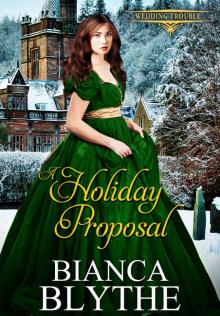 A Holiday Proposal (Wedding Trouble Book 6)
A Holiday Proposal (Wedding Trouble Book 6) The Earl's Christmas Consultant (Wedding Trouble Book 3)
The Earl's Christmas Consultant (Wedding Trouble Book 3) A Kiss for the Marquess (Wedding Trouble Book 5)
A Kiss for the Marquess (Wedding Trouble Book 5) My Favorite Duke (The Duke Hunters Club Book 2)
My Favorite Duke (The Duke Hunters Club Book 2) The Sleuthing Starlet Mysteries
The Sleuthing Starlet Mysteries Lords, Snow and Mistletoe
Lords, Snow and Mistletoe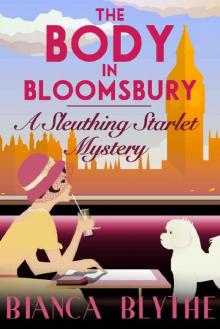 The Body in Bloomsbury
The Body in Bloomsbury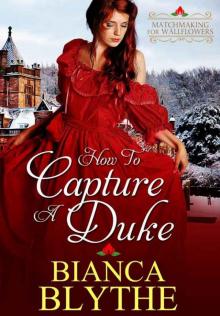 How to Capture a Duke (Matchmaking for Wallflowers Book 1)
How to Capture a Duke (Matchmaking for Wallflowers Book 1)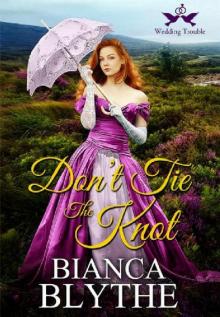 Don't Tie the Knot
Don't Tie the Knot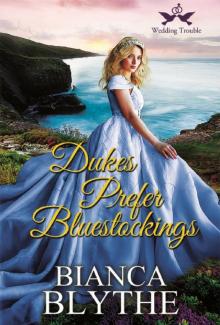 Dukes Prefer Bluestockings
Dukes Prefer Bluestockings A Marquess for Convenience (Matchmaking for Wallflowers Book 5)
A Marquess for Convenience (Matchmaking for Wallflowers Book 5) Lords, Snow and Mistletoe: A Regency Christmas Collection
Lords, Snow and Mistletoe: A Regency Christmas Collection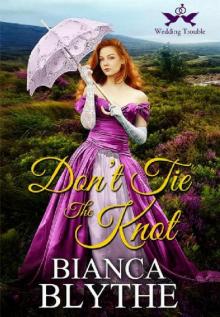 Don't Tie the Knot (Wedding Trouble Book 1)
Don't Tie the Knot (Wedding Trouble Book 1)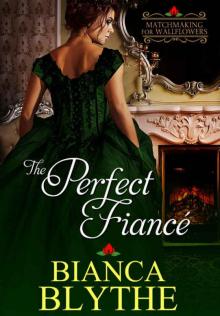 The Perfect Fiancé (Matchmaking for Wallflowers Book 0)
The Perfect Fiancé (Matchmaking for Wallflowers Book 0)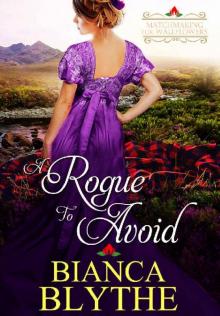 A Rogue to Avoid (Matchmaking for Wallflowers Book 2)
A Rogue to Avoid (Matchmaking for Wallflowers Book 2)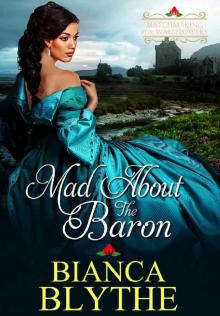 Mad About The Baron (Matchmaking for Wallflowers Book 4)
Mad About The Baron (Matchmaking for Wallflowers Book 4)